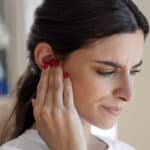Are Hearing Aids a Good Mother’s Day Gift?

Mother’s Day is on May 11th. With that day fast approaching, you’re probably wondering what to give your mom to say thank you for all she’s done for you. Flowers, jewelry, candles and chocolates are at the top of the list for many people. While these are all great options, one more you may not…
Why Is Spring the Perfect Time to Focus On Your Hearing Health?

Spring is all about fresh starts. You get outside more, make plans with friends, clean your house and start checking things off your to-do lists again. It’s also the perfect time to check in on your health—including your hearing. If you’ve noticed it’s harder to follow conversations or enjoy the little details in your environment,…
The Relationship Between Tinnitus and TMJ

Tinnitus, often described as ringing or buzzing in the ears when no sound is present, is a common condition that can stem from various underlying issues. One less known but significant cause is temporomandibular joint disorder (TMJ), a condition that affects the jaw joint and its surrounding muscles. For those experiencing both TMJ and tinnitus,…
What to Know About Diplacusis

Diplacusis is a hearing condition that causes a person to perceive sounds in different pitches or at two different times. It’s also known as double hearing and typically arises when a person already has hearing loss. Diplacusis is more prevalent than realized, and a person with normal hearing may have a one to two percent…
Is Your Home Too Loud? Everyday Sounds That Could Be Harming Your Hearing
Hearing loss is common, with nearly 15 percent of American adults reporting some trouble hearing. Everyday sounds in the home, from kitchen appliances to yard tools, can contribute to gradual hearing loss. Awareness of noise levels at home is essential for long-term hearing health. How Hearing Loss Occurs Hearing loss occurs when tiny, fragile hair…
Five Signs It’s Time to See an Audiologist

Hearing plays an important role in your daily life. It connects you to your loved ones, brings your favorite music to your ears and so much more. Despite all it does for you, many people ignore early signs of hearing issues. An audiologist specializes in diagnosing and treating hearing and balance disorders, helping you maintain…
Understanding How Your Ears Work: A Journey Through Hearing

Your ears are remarkable organs designed to pick up and interpret sounds from the world around you. Each part of your ear—the outer, middle and inner ear—plays an essential role in helping you hear. Let’s explore how these components work together to turn sound waves into the songs, conversations and tiny noises you experience every…
Hearing Aids and Tinnitus Management: What To Know

Tinnitus, a symptom affecting more than 50 million people in the United States, causes a frustrating ringing, buzzing or hissing sound in your ears. Sometimes, it’s fleeting and lasts just a few moments, but for others, tinnitus is chronic, sticking around for three months or longer. Chronic tinnitus can take a toll on your emotional…
Understanding Waterproof and Water-Resistant Hearing Aids: What You Should Know

If you enjoy outdoor activities or live in an area with unpredictable weather, you may have wondered how to protect your hearing aids in wet environments. Whether you’re hiking in the rain or spending the day at Katy Lake, keeping your devices safe from water damage is essential. That’s where waterproof and water-resistant hearing aids…
Celebrate Audiology Awareness Month by Protecting Your Hearing

October is Audiology Awareness Month, a time dedicated to highlighting the importance of hearing health and raising awareness about hearing loss prevention. Contrary to popular belief, hearing loss isn’t an inevitable part of aging. While age-related hearing loss does affect many, it’s not the only factor that can impact your hearing. Genetics, certain illnesses, physical…